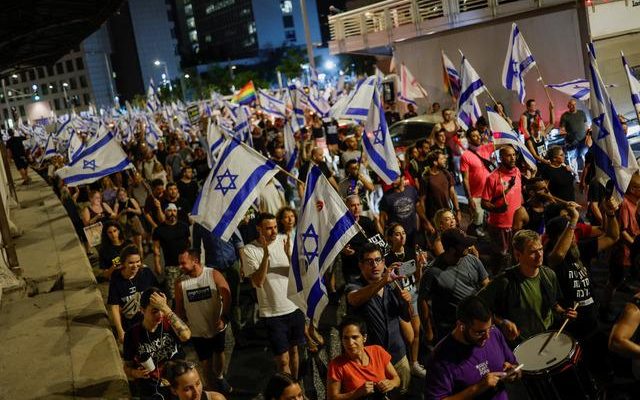Protesting that the coalition government led by Prime Minister Benjamin Netanyahu passed the bill that lifts the Supreme Court’s control over the government within the scope of judicial regulation, Israelis took to the streets across the country.
Israelis, who hold mass demonstrations every Saturday evening against the judicial regulation and right-wing policies of the extreme right-wing coalition government led by Netanyahu, are leaving their 30th week behind in their protests.
Hundreds of thousands of Israelis participated in demonstrations in dozens of different points across the country, especially in cities such as Tel Aviv, West Jerusalem, Haifa, Birussebi, Herzliya and Rehovot.
The protesters gathered in front of the Government Complex on Kaplan Street in Tel Aviv, which hosts the largest demonstration, as it does every week.
Speaking on the stage set up here, Shikhma Bressler, one of the leaders of the anti-Netanyahu government protest movement, said that after the government passed the judicial regulation law, “they must increase the resistance and they will do it”.
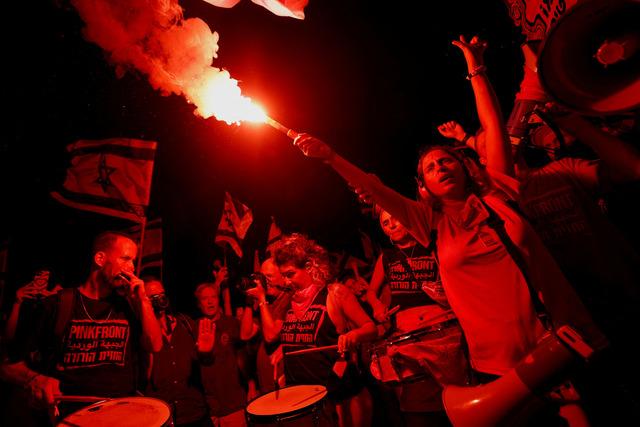
The demonstrators chanted “democracy” slogans with drums, whistles and air horns. Protesters carrying Israeli flags carried banners, placards and pictures criticizing the coalition government’s judicial regulation and far-right politicians.
Following the approval of the law on judicial regulation in the Parliament, the demonstrators unfurled a giant banner saying “Israel has lost its credit”, pointing to warnings from international credit institutions for the Israeli economy.
An estimated 130,000 people attended the demonstration on Tel Aviv’s Kaplan Street, according to an estimate from Kanal13, a company that does audience analysis by area.
Israeli police announced that a group of demonstrators trying to block the city’s main artery, the Ayalon Highway, were blocked.
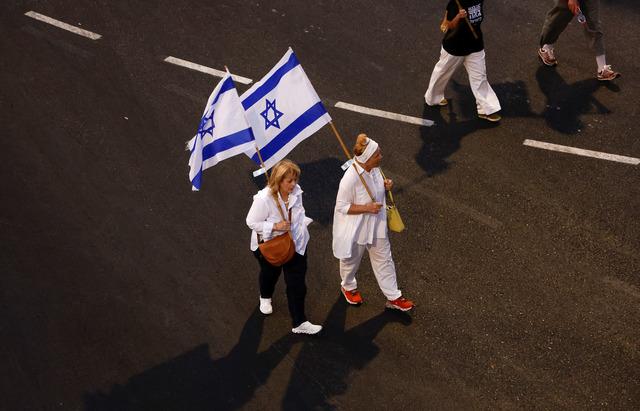
After the demonstration on Kaplan Street in Tel Aviv broke up, the demonstrators tried to reach the Ayalon Highway by proceeding from different roads in the city. The Israeli police took security measures along the marching route of the demonstrators. It was noted that plain-clothed police officers were around during the demonstrators.
The demonstrators arrived in front of a military base in central Tel Aviv and marched to the house of Israeli Parliament Speaker Amir Ohana. The Israeli police took security measures with iron barricades and mounted units.
In the images reflected on the social media, it was reflected that a driver drove the vehicle over the demonstrators who blocked the road. Israeli police announced that one person was slightly injured in the incident and the driver was taken into custody.
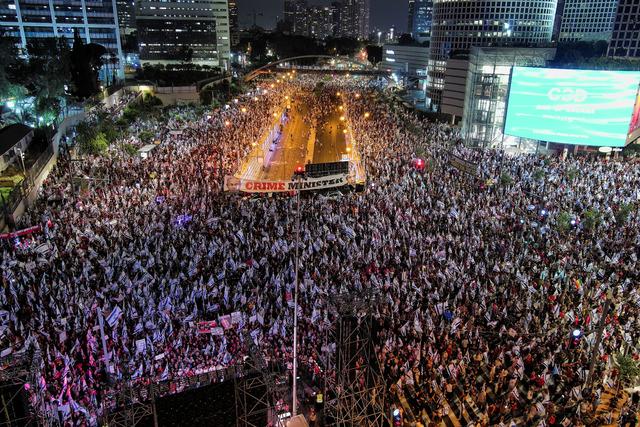
A group of demonstrators blocked the highway in the area at the Karkur junction near Haifa in northern Israel. The police intervened in the group blocking the road and detained one person.
Opposition leaders also participated in demonstrations held in different parts of the country.
LAUNCHES AN INVESTIGATION REGARDING PANTS WITH PICTURES OF POLICE OFFICERS PRINTED
A group of demonstrators carried the pictures and names of some police officers, which were captured on cameras during their intervention in previous demonstrations, on banners with the inscription “Attention”.
Israeli police announced that they have launched an investigation into the banners with the names and pictures of the officers.
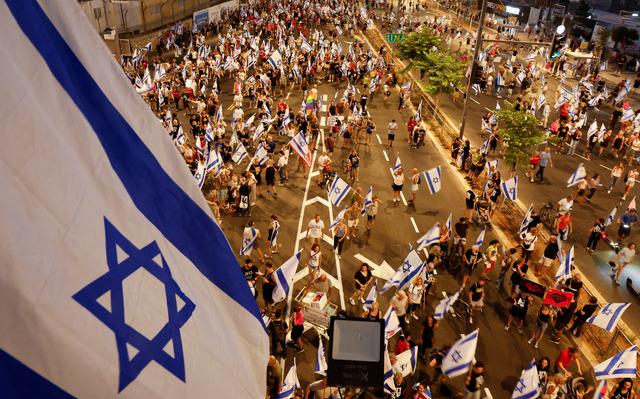
The far-right Minister of National Security in charge of the police in Israel, Itamar Ben-Gvir, stated in his social media post that the demonstrators targeting the police is a “red line” and that he fully supports the said officers.
DISCUSSIVE JURISDICTION
The “judicial reform” announced by Israeli Minister of Justice Yariv Levin on January 5 includes changes such as limiting the powers of the Supreme Court and the power to have a say in judicial appointments.
Prime Minister Benjamin Netanyahu announced on March 27 that he postponed the judicial regulation, which led to increasing mass protests and strikes across the country, but announced that they would bring the judicial regulation back to the agenda after the 2023-2024 budget was passed by the Parliament at the end of May.
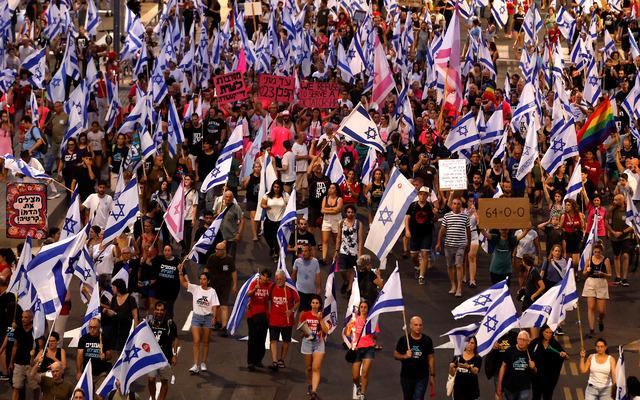
The government had recently pushed the button again for judicial regulation after negotiations with the opposition stalled.
The Netanyahu government adopted the bill that would lift the Supreme Court’s control over the government, in a parliamentary session boycotted by the opposition on July 24, despite mass protests and intense public debate across the country.
Opposing the government’s “judicial reform”, thousands of Israelis, including fighter pilots, submarine officers, and other elite troops, had decided to resign as volunteers.
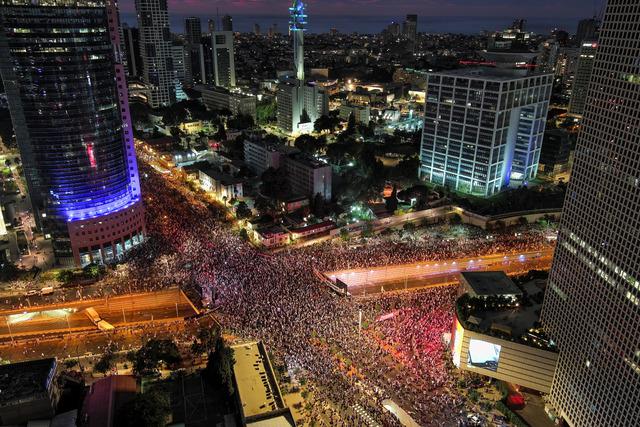
Names who held high positions in politics, army, security, economy and judiciary in Israel declared that they were against the government’s judicial regulation.
The protest movement against the Netanyahu government’s judicial regulation has been continuing its demonstrations for about 7 months. (AA)
